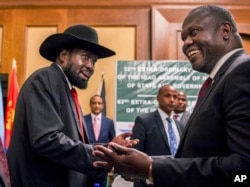A top South Sudanese official says the government opposes creation of a war crimes court, a key aspect of the peace deal which the country's warring parties recently reaffirmed.
The projected court would be a hybrid of South Sudanese judges and international war crimes experts, tasked with trying those accused of committing atrocities during South Sudan's nearly five-year civil war.
Civil society activists say the "hybrid court" should be established without delay to end rampant impunity in South Sudan.
But speaking to reporters in Juba this week, Information Minister Michael Makuei labeled the court "a tool of regime change by the troika" — the United States, Britain and Norway.
Makuei said anything that presents an obstacle to implementation of the peace agreement is unwelcome, but he argued the troika countries and other regional bodies should prioritize peace.
"The hybrid court is an instrument they want to use against the people of South Sudan, especially the leadership of South Sudan. They want to use it in a sense that because the agreement gives the hybrid court the right to indict anybody at any time and once you are indicted, you are apprehended and taken to jail," he said.
Last month, the U.S. State Department urged the Kiir administration to set up the hybrid court to ensure that the perpetrators of crimes — including widespread killings of civilians — face justice. Human Rights Watch has echoed that call.
The troika also raised concerns about President Kiir's recent amnesty offer, which they say could derail the process of accountability.
Makuei said the international community should focus on bringing sustainable peace to South Sudan by promoting reconciliation, healing and peaceful co-existence, and worry about accountability later.
"Instead of you pressing for the establishment of a hybrid court, why don't you go in for compensation and healing process, for reparation and compensation and you go in for the reconciliation? Once you start all these, automatically you will be dismantling whatever plans people have for the hybrid court," Makuei argued.
Civil society activists said South Sudanese need accountability now, which goes hand in hand with peace.
Jackline Nasiwa, head of the Juba-based Center for Inclusive Governance Peace and Justice, a local NGO that worked on the peace deal, said Makuei's argument does not make sense.
"This debate of saying peace first and justice later shouldn't have come now, after the peace [deal] is signed, because by virtue that Chapter Five is part of the peace agreement and then it has to be implemented as it is. What citizens are calling for is an end to impunity," Nasiwa told VOA's South Sudan in Focus.
Chapter Five of the revitalized peace agreement spells out the establishment of the hybrid court as well as compensation and reparations for the victims of crimes committed during the conflict.
Nasiwa said the Kiir administration is trying to create the false impression that the hybrid court is a foreign concept.
James Okuk, a political science lecturer at the University of Juba, said the hybrid court is a crucial part of the agreement to which all the parties must adhere.
"After eight months when the government is formed, this is where we will have the headache of the hybrid court of South Sudan and you will not do away with it because it is part of the agreement," Okuk told VOA's South Sudan in Focus.





